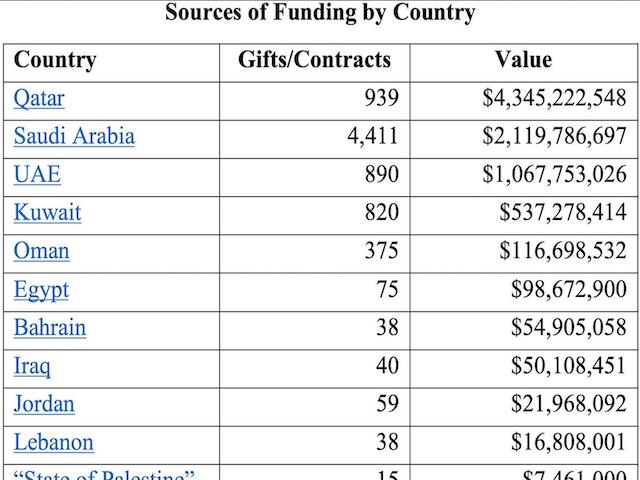The recent surge in antisemitic sentiments and incidents on American college campuses has sparked a significant amount of concern and debate. This worrying trend, characterized by an uptick in hostility and aggression towards Jewish students and the broader Jewish community, necessitates a deeper exploration into its origins and driving factors. A critical piece of this puzzle is the revelation of substantial, undisclosed financial contributions from foreign governments to American higher education institutions, as detailed in a groundbreaking report by the Network Contagion Research Institute (NCRI).
The NCRI, a nonprofit organization committed to uncovering the spread of hate and misinformation through social networks, has brought to light the covert injection of around $13 billion into over 200 American colleges and universities. This funding, predominantly sourced from authoritarian regimes in the Middle East, has evaded legal disclosure requirements, casting a shadow over the transparency and integrity of these academic institutions.
It’s like we have all feared…
— Visegrád 24 (@visegrad24) December 20, 2023
A new report from @ncri_io shows that the Wahhabi state of Qatar has been pumping billions of dollars into American universities.
The reports shows it has become much more difficult to track the money in recent years.
Full report in the comments pic.twitter.com/17V27zGOnC
The release of the NCRI's report is timely, coinciding with a wave of highly publicized antisemitic incidents across various campuses. These incidents have ranged from direct threats to Jewish students to unsettling endorsements of violent attacks by academic figures. These actions not only instill fear and division within campus communities but also prompt a critical examination of the ideologies that fuel such hatred.
A key aspect of this discourse is the identification of a deeply entrenched, morally relativistic ideology that is inherently anti-Israel and anti-American. This perspective, which has found a stronghold in the humanities and social sciences departments of elite universities, systematically portrays Israel as a colonialist entity, deserving of resistance and condemnation. The narratives spun within these academic circles serve to legitimize and normalize antisemitism under the guise of scholarly critique.
Foreign funding must also be addressed, especially from Qatar.
— Fennec des Fagnes 🇺🇦🎗🇧🇪 (@FennecdesFagnes) December 21, 2023
The following NCRI report is rather worrying. And explains a lot:https://t.co/DrWntqJSji
The NCRI's findings establish a clear link between the undisclosed foreign funds and the rise in antisemitic incidents on campuses. The data reveals a staggering 300 percent increase in antisemitic actions at universities receiving financial support from Middle Eastern donors, compared to those that do not. Furthermore, institutions accepting undisclosed contributions from authoritarian sources exhibit a 250 percent rise in such incidents. This correlation underscores the potential influence of foreign funding on fostering an environment where antisemitism flourishes.
Among the contributors, Qatar is highlighted for its significant financial investments in American higher education, coinciding with its role as host to the leadership of Hamas. While the direct impact of these contributions on campus climates is multifaceted, the association between Middle Eastern financial support and campus antisemitism raises profound concerns regarding academic freedom and the role of universities as havens for open inquiry and tolerance.
How University Presidents are able to say legally that they are not getting funding from the “state of Qatar”.
— ISGAP (@ISGAP1) December 6, 2023
ISGAP REPORT LAYS OUT HOW QATAR IS FUNNELLING MONEY INTO THE USA, EUROPE AND THE REST OF THE WORLD THROUGH STATE PROXIES.
Read the report 👇https://t.co/1CMrEf0xqB pic.twitter.com/J4LDRPBRtL
Addressing this complex issue requires a nuanced understanding of the interplay between financial incentives and ideological commitments. Figures such as Larry Summers, former president of Harvard University, emphasize that while financial motivations are evident, the ideological sympathies of certain faculty members towards anti-Israel sentiments play a crucial role. The allure of Middle Eastern funding may prompt universities to align with the preferences of their benefactors, potentially compromising academic integrity and freedom of expression.
The lukewarm response of university administrations to the rising tide of campus antisemitism is disconcerting. Their hesitancy to decisively address these issues, coupled with the issuance of noncommittal statements following antisemitic episodes, highlights a failure to tackle the root causes of this unrest.
Much larger amounts concern funding provided by Qatar which, according to NCRI, was not the US$1.2 billion previously reported but, in fact, was US$2.2 billion.https://t.co/sSqgU39vml
— MelissaOsborne53 (@mo5330266414) December 10, 2023
Confronting the uncomfortable realities unveiled by the NCRI's report is essential for addressing the influence of foreign funding on American educational institutions. The path forward involves reaffirming the principles of open inquiry and mutual respect that are fundamental to academic excellence. Only through such efforts can we hope to counteract the spread of antisemitism and restore a sense of security and inclusiveness within our campus communities.


